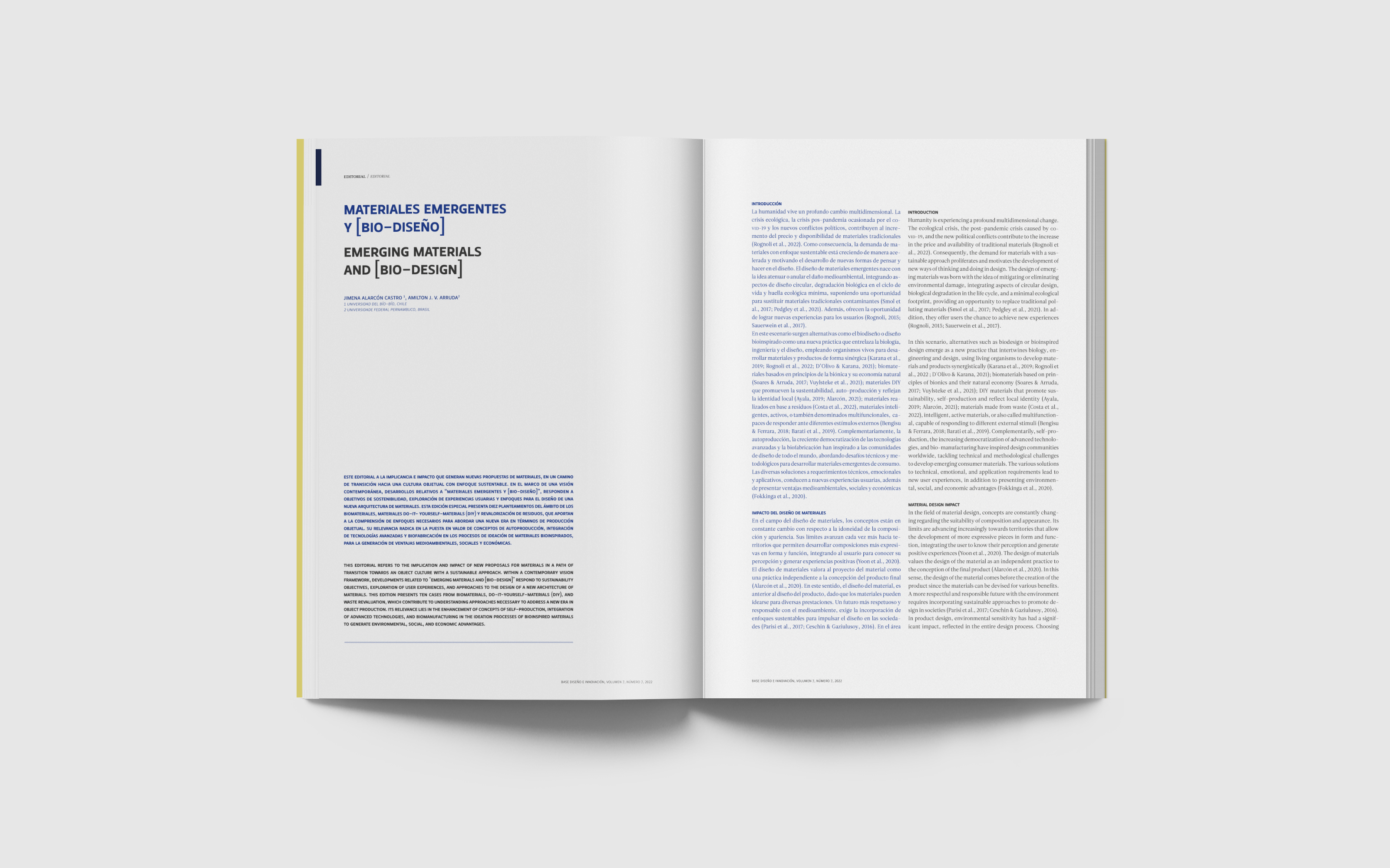Editorial: Emerging materials and [bio-design]
Main Article Content
Abstract
The editorial refers to the implication and impact of new proposals for materials in a path of transition towards an object culture with a sustainable approach. Within a contemporary vision framework, developments related to "Emerging materials and [bio-design]" respond to sustainability objectives, exploration of user experiences, and approaches to the design of a new architecture of materials. This special issue presents ten cases from biomaterials, Do-It-Yourself-Materials (DIY), and waste revaluation, which contribute to understanding approaches necessary to address a new era in object production. Its relevance lies in the enhancement of concepts of self-production, integration of advanced technologies, and biomanufacturing in the ideation processes of bioinspired materials to generate environmental, social, and economic advantages.
Article Details
References
Alarcón, J. (2021). Diseño de materiales emergentes desde un enfoque basado en la naturaleza. Cuadernos del Centro de Estudios en Diseño y Comunicación. Ensayos, (149), 223-235.
Alarcón, J., Rognoli, V., & Llorens, A. (2020). Diseñar para un escenario social incierto. el valor del enfoque materiales do-it-yourself y economía circula. Interciencia, 45(6), 279-285.
Ayala-García, C. (2019). The materials generation. The emerging experience of DIY-Materials. Doctoral Thesis. Politecnico di Milano, Italy.
Barati, B., Karana, E., & Hekkert, P. (2019). Prototyping materials experience: Towards a shared understanding of underdeveloped smart material composites. International Journal of Design, 13(2), 21-38.
Bengisu, M., & Ferrara, M. (2018). Materials that move: smart materials, intelligent design. Springer.
Ceschin F., & Gaziulusoy, I. (2016). Evolution of design for sustainability: From product design to design for system innovations and transitions. Design studies, 47: 118-163. https://doi.org/10.1016/j.destud.2016.09.002
Costa, C., Viana, A., Silva, C., Marques, E. F., & Azoia, N. G. (2022). Recycling of textile wastes, by acid hydrolysis, into new cellulosic raw materials. Waste Management, 153, 99-109. https://doi.org/10.1016/j.wasman.2022.08.019
D’Olivo, P., & Karana, E. (2021). Materials Framing: A Case Study of Biodesign Companies’ Web Communications. She Ji: The Journal of Design, Economics, and Innovation, 7(3), 403-434. https://doi.org/10.1016/j.sheji.2021.03.002
Fokkinga, S., Desmet, P., & Hekkert, P. (2020). Impact-centered design: Introducing an integrated framework of the psychological and behavioral effects of design. International Journal of Design, 14(3), 97.
Graedel, T. E., & Allenby, B. R. (1995). Matrix approaches to abridged life cycle assessment. Environmental Science & Technology, 29(3), 134A-139A.
Karana, E., Nimkulrat, N., Giaccardi, E., Niedderer, K., & Fan, J. N. (2019). Alive. Active. Adaptive: Experiential knowledge and emerging materials. International Journal of Design, 13(2), 1-5.
Parisi, S., Rognoli, V., & Sonneveld, M. (2017) Material Tinkering. An inspirational approach for experiential learning and envisioning in product design education. The Design Journal, 20(sup1), S1167-S1184. https://doi.org/10.1080/14606925.2017.1353059
Pedgley, O., Rognoli, V., & Karana, E. (2021). Expanding territories of materials and design. In Materials Experience 2 (pp. 1-12). Butterworth-Heinemann. https://doi.org/10.1016/B978-0-12-819244-3.00028-4
Rognoli, V., Bianchini, M., Maffei, S., & Karana, E. (2015). DIY materials. Materials & Design, 86, 692-702. https://doi.org/10.1016/j.matdes.2015.07.020
Rognoli, V., Petreca, B., Pollini, B., & Saito, C. (2022a). Materials biography as a tool for designers’ exploration of bio-based and bio-fabricated materials for the sustainable fashion industry. Sustainability: Science, Practice and Policy, 18(1), 749-772. https://doi.org/10.1080/15487733.2022.2124740
Rognoli, V., Anselmi, L., & Poblete, S. D. (2022b). Materiales alternativos emergentes. Un enfoque de diseño sostenible. Cuadernos del Centro de Estudios en Diseño y Comunicación. Ensayos, (166), 123-132.
Sauerwein, M., Karana, E., & Rognoli, V. (2017). Revived beauty: research into aesthetic appreciation of materials to valorise materials from waste. Sustainability, 9(4), 529. https://doi.org/10.3390/su9040529
Smol, M., Kulczycka, J., & Avdiushchenko, A. (2017). Circular economy indicators in relation to eco-innovation in European regions. Clean Technologies and Environmental Policy, 19(3), 669-678. https://doi.org/10.1007/s10098-016-1323-8
Soares, T., & Arruda, A. J. (2017). Ecomateriais biomiméticos, um caminho eficiente para a sustentabilidade. MIX Sustentável, 3(4), 29-45. https://doi.org/10.29183/2447-3073.MIX2017.v3.n4.29-45
Vuylsteke, B., Ostuzzi, F., Saldien, J., Detand, J. (2022). Pathway for Designing with New DIY, Circular and Biobased Materials: Insights from Three Case Studies. In: Scholz, S.G., Howlett, R.J., Setchi, R. (eds) Sustainable Design and Manufacturing. KES-SDM 2021. Smart Innovation, Systems and Technologies, vol 262. Springer, Singapore. https://doi.org/10.1007/978-981-16-6128-0_5
Yoon, J., Pohlmeyer, A. E., Desmet, P. M., & Kim, C. (2020). Designing for positive emotions: issues and emerging research directions. The Design Journal, 24(2), 167-187. https://doi.org/10.1080/14606925.2020.1845434


